Health & Fitness Blog
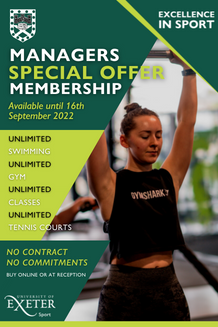
Managers Special
This overwhelm is real and can often be the biggest hurdle that people have to get over in order to start their journey towards better health and fitness. Exeter Uni Sports are here to help with a few helpful pointers of how to leap over this hurdle and get started!
It’s a common story. Someone wishes to improve their physical (and maybe mental) health, but feels overwhelmed by the size of the gap between where they are and where they want to be. This overwhelm is real and can often be the biggest hurdle that people have to get over in order to start their journey towards better health and fitness. Exeter Uni Sports are here to help with a few helpful pointers of how to leap over this hurdle and get started!
1. 10% Inspiration, 90% Perspiration
The famous inventor Thomas Edison famously said, ‘Success is 10% inspiration and 90% perspiration”. And we think he was right! With a small amount of focus, planning and goal-setting (the inspiration), you can design a routine for your health and fitness which you can then make work for you (the perspiration).
Make it fresh, centre it around activities which you enjoy and don’t ‘run before you can walk’. Pick a comfortable starting point and then build a gradually increasing level of challenge and difficulty into your routine to make sure that you don’t plateau in your health and fitness journey.
And remember, your health and fitness journey isn’t simply about the physical. Build mental health goals into your routine too to ensure that you are looking after both body and mind.
2. Get Outside!
We live in a beautiful part of the world where moors, beaches, forests and other natural open spaces are abundantly accessible. And, as we have recently experienced, when the weather is good, these places become even more beautiful and accessible!
Research has shown that there is a direct link between Vitamin D (which our bodies receive from sunlight) and improved physical health. For example, it is vital for good bone health and also boosts muscle function and immune response.
So, why not leave the treadmill, exercise bike and rowing machine for the colder/darker months and go for a ride on the Devon lanes, take a sea swim or go for a run around your local park?
Friendship = Fuel
More than ever, friends and colleagues are choosing to exercise together rather than alone. This means that they enjoy the social and relational element of exercise as well as the physical and mental health benefits.
This is great on so many levels, particularly that some of the alternative activities to socialising with others are common stumbling blocks for good health and fitness. After work drinks, limited and non-healthy food options at restaurants, junk food at the cinema… the list goes on. These are all really fun treats but, consumed too often, have negative health impacts.
So why not choose to find a form of exercise that you and your friend, family member or colleague can enjoy together?
Here at Exeter University Sports, we can help with all of the above and more. Between now and 16th of September, customers pay £62.50 and they can have unlimited access to Swimming, Gym, Classes and all Tennis Courts (indoor and covered). And this is with no annual commitment to the gym. Even better, if you want to share a joint membership with a friend, family member of colleague, the same facilities can be accessed on the same basis for £112.50 (£56.25 each).
To explore the range of physical health facilities, teams and opportunities which Exeter University Sport offers, visit here to find out more.
Date: 8 August 2022
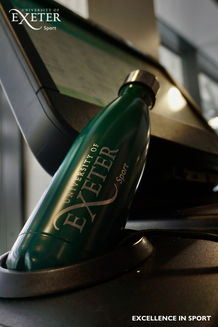
Exeter Sport ECO Bottle
Here are a few tips for making positive habitual change to your everyday health and fitness.
Have you ever heard of an axiom? It is the word used to describe a commonly believed and accepted fact which is, in fact, not necessarily proven. Let us give you an example. It only takes 21 days to form a new habit. This is repeated worldwide by scientists, fitness experts, behavioural therapists, sports psychologists and many more. However, it simply isn’t true.
Well, for some personality types, it can take as short as 18 days to form a new habit. But the average amount of time it takes someone to do so is, in fact, 66 days (so, more than two months).
This is one of the many wonders of the human body – the ability to ‘re-wire’ one’s own brain and form new routines and habits. The technical term for this ability is ‘self-directed neuroplasticity’ and essentially this ability means that you can, in fact, teach an old dog new tricks! So, no matter how old you are, it is never too late to make positive and lasting changes to your health and fitness.
According to Psychology Today, habits form ‘when new behaviors become automatic and are enacted with minimum conscious awareness.’ That's because the behavioral patterns that we repeat most often are literally etched into our neural pathways.
So, here are a few tips for making positive habitual change to your everyday health and fitness.
1. Make a Plan
You know the famous phrase… ‘If you fail to plan, you plan to fail’. Annoyingly, it’s true. So, spend some time working out how you are going to work regular exercise into your daily routine. Where will you go? Who will you be with? Will you need any additional equipment? What do you hope to achieve from this plan? Importantly, write it down or keep a record of it. It’ll keep you honest and increase the chances of you sticking to the plan.
2. Mix It Up
Even though it might seem logical to pick your favourite types of exercise, they may not be sustainably interesting to continue doing regularly for the long term. So, build a few different types of exercise into your plan. This will keep things interesting and give you one less excuse to drop a training session because it is starting to feel monotonous or repetitive.
3. Be Flexible
The best plans factor in variation and an element of the unexpected. For example, is your exercise plan restricted by your location or could you, in theory, maintain it wherever you were in the world? Also, if you had planned to exercise for an hour but your day didn’t pan out as planned, instead of cancelling it altogether, why not still get in a 30-minute workout?
4. Be Kind to Yourself
Sometimes your head just isn’t in the game. We know what it’s like. It’s a tough balance because exercise can often be a great antidote to low mood, anxiety or feeling overwhelmed. However, sometimes, you need to be kind to your mind and take a night off.
Also, over-training is a very real and dangerous phenomenon. It might be that your body is feeling the toll of an increased level of exercise and you need to pull back slightly and reduce the amount or intensity of your exercise in order to carry on sustainably..
5. Celebrate Your Progress
What’s the point in all of the blood, sweat and tears if you don’t make a point of celebrating an achieved goal or reached milestone? So, have you hit one of your goals? Let your hair down! Do something special (with someone special perhaps) to mark your achievement. And make it memorable as that will spur you on when you set your next increased goal for the future ;) !
So, there it is. Don’t believe the axioms. Embrace self-directed neuroplasticity and look forward to forming more positive and lasting habits for your mental and physical health and fitness.
To find out about the range of physical health facilities, teams and opportunities which Exeter University Sport offers, visit https://sport.exeter.ac.uk to find out more.
Date: 7 July 2022
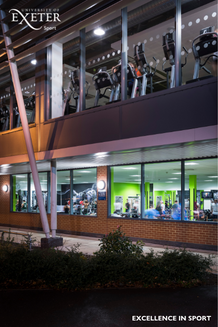
Outside Streatham Sports Park
A boring food truth is that no one else is going to make good dietary choices for you and, therefore, self-discipline is the cornerstone of long-term better health and fitness. There’s just no way around it. So, here are three significant factors which can make or break your journey towards making better food choices:
Don’t eat yellow snow. Eat your five-a-day. Leave your microwave meal to stand for at least 2 minutes after cooking (if you want to have a roof of your mouth left that is). Just a few examples of pieces of advice that we’re given about food which are boring but, nevertheless, true or helpful.
Another example of a boring food truth is that no one else is going to make good dietary choices for you and, therefore, self-discipline is the cornerstone of long-term better health and fitness. There’s just no way around it.
However, as most of us don’t really like being told what to do (or what not to do), ruly only we as individuals can make good sustainable choices about our lifestyle and health.
So, here are three significant factors which can make or break your journey towards making better food choices:
-
COST
It is a bit of a misnomer that eating well (and healthily) has to cost the earth. For example, if you tally up the total cost of the ‘cheat day’ treats, pints at the pub or cheeky weekend takeaways, they probably far surpass any additional cost incurred by making healthier choices in your weekly shop.
Also, when thinking of other health-related costs such as gym membership or paying to join a team/club of your preferred sport, it’s important to see this as an investment in your own health and wellbeing. As with any investment, you’d hope to see a healthy return over time (no pun intended!), so it is in your interest to make sure it is money well spent.
-
SELF-WORTH
If we’re all honest with ourselves, one of the hurdles to making long-term positive decisions about our health is whether we truly value ourselves or not. After all, why would you invest in your future and betterment if you didn’t believe that this was a worthwhile venture?
So, from a holistic standpoint, part of making better long-term physical health choices is investing in your mental health and building your confidence and resilience over time. Perhaps a personal trainer could help with this for example?
-
DELAYED GRATIFICATION
Arguably, one of the most underrated skills that a human can develop is the ability to delay their own gratification. In a culture which promises so much but often disappoints or falls short, a more certain path to choose is to resist the empty promises and make small and regular good decisions each day which, over time, add up to significant gains.
Often, the easier decision to make is not the most beneficial one. But, if you can alter your mindset and develop some willpower to resist the many well-marketed temptations that exist out there, it will surely pay off over time.
To find out about the range of physical health facilities, teams and opportunities which Exeter University Sport offers, visit https://sport.exeter.ac.uk to find out more.
Date: 31 May 2022
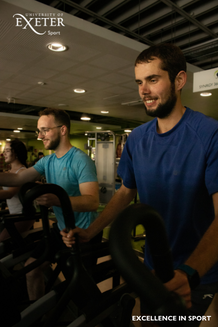
Ollie & Mark training together in the Russel Seal Fitness Centre
Having just one other person along with you on your fitness and exercise journey can ‘super-charge’ the process and give you more focus, staying power and, ultimately, gains. In recognition of this (and in response to the challenges which people are facing with the current Cost of Living Crisis), Exeter University Sport have added a Joint Membership option to their Summer Membership: where two designated people can share the benefits and cost of a membership.
Engines with twin-turbochargers increase air and fuel intake by nearly twice as much as the same engine would without a turbocharger. Because of this, twin-turbocharged engines boast incredible performance that leaves other cars with one turbocharger in a cloud of dust behind them.
In the same way, having just one other person along with you on your fitness and exercise journey can ‘super-charge’ the process and give you more focus, staying power and, ultimately, gains.
In recognition of this (and in response to the challenges which people are facing with the current Cost of Living Crisis), Exeter University Sport have added a Joint Membership option to their Summer Membership: where two designated people can share the benefits and cost of a membership.
This means that two members can train together, cheer each other on, join a team together etc but at, essentially, half the cost the would’ve previously had to pay.
And you can get creative and competitive with it too! It’s amazing what a difference that healthy competition can make. Whether it pushes you that 5% further to lift a heavy weight, helps you to swim that couple of seconds faster or pushes you to add an extra mile to your run when everything else is telling you to stop and go eat that half-finished pizza from the weekend in the fridge.
So, who is your ‘twin-turbo’ partner? Maybe it’s time your worked that out and got in touch with Exeter University Sport.
To find out about the range of physical health facilities, teams and opportunities which Exeter University Sport offers, visit https://sport.exeter.ac.uk/healthandfitness/memberships/ to find out more.
Date: 31 May 2022
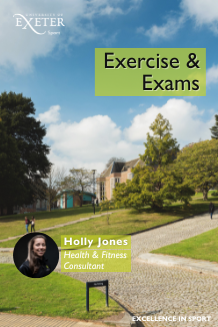
Streatham Campus
Our newest Health and Fitness Consultant Holly, knows exactly what it's like to go through Term 3, as it wasn't too long ago that she was sitting in those very exam seats. She gives us her best advice and top tips for coping through the next few months, and how important physical activity is for you...
During exam period, it’s likely that you’ll find yourself spending a large part of the day sat down revising. Of course it is important to revise for exams, but looking after yourself by eating well, sleeping well and being active.
When stressed, your ability to focus and process information decreases, however with exercise your mental and physical states can be improved. Exercise releases endorphins which are known as ‘feel good’ hormones, this results in improved mood and motivation. Any type of physical activity improves blood flow to the brain, this fires up neurones and promotes cell growth which helps improve concentration. These responses to physical activity and exercise can reduce stress, help you focus when revising and improve memory.
Finding the time and motivation can be hard, but here are a few tips to make it to be active during exam periods:
-
Take regular breaks for movement such as a walk or taking part in a class. This will allow you to clear your head and feel more refreshed when revising.
-
Build a routine around when you work best, and allow yourself time to fit in some activity either as a break or in the morning before revising to improve your concentration.
-
Walk to your exams, this can help to relax you and focus your thoughts.
-
Be active with friends, this is also an opportunity to socialise which improves overall wellbeing.
When I was a student, this is what an example revision schedule day was for me:
8AM – wake up and go to the gym
9AM – breakfast
9:30AM – 12:30PM – revision with 5-10min breaks every 30min to stretch.
12:30 – 1:30PM Lunch and a short walk
1:30-5:30PM - revision with 5-10min breaks every 30min to stretch.
5:30PM – athletics club/walk to shop
7:00PM – Dinner & Socialise
Good luck for your exams!
Date: 6 May 2022

Pride Ride with Tracey
There is a famous African proverb which states that, “If you want to go far, go together. If you want to go fast, go alone.”Clearly, in the world of sport and fitness, there are many cases where speed is paramount and trying to be the fastest is essentially the aim (or one of the primary aims) of the sporting activity. However, one of the biggest challenges and barriers to ongoing training and consistent exercise is motivation. We discuss it all here...
There is a famous African proverb which states that, “If you want to go far, go together. If you want to go fast, go alone.”
Clearly, in the world of sport and fitness, there are many cases where speed is paramount and trying to be the fastest is essentially the aim (or one of the primary aims) of the sporting activity.
However, one of the biggest challenges and barriers to ongoing training and consistent exercise is motivation. And one of the key things which motivates people to stay committed to a routine beyond the initial honeymoon period is other people!
We all need someone to bang down our door at 6am when we’ve snoozed our alarm one-too-many times before our agreed morning run. Or someone to scream words of encouragement at us and spur us on when we feel like we’ve got no ‘gas left in the tank’. Or even someone to give us some tough love or banter when we keep cancelling on plans to exercise together.
From personal experience we’ve found that, over time, this is a major factor in how sustainable and successful an exercise regime (and the benefits of that exercise) can be.
Moreover, some of the most needed moments of connection with other people can happen whilst exercising. You are sharing an experience and often a common goal together and there is definitely something about the process of going through physical challenge and exertion with someone that breaks down some of the barriers that can exist in life between people.
Once those barriers are down, deeper connections can be made and, ultimately, greater results can be achieved – both relationally and in terms of fitness.
So, why not give some thought to arranging a weekly swim or game of tennis with a friend? Or bite the bullet and enquire about joining a team in a sport you enjoy.
Pushing through that initial fear and awkwardness will (probably) be one of the best decisions you make this year.
To find out about the range of physical health facilities, teams and opportunities which Exeter University Sport offers, visit https://sport.exeter.ac.uk to find out more.
Date: 6 April 2022
At Exeter Sport, we know how attending a gym can make you feel, and we want to make sure you have all the knowledge you need. Leah, who is one of our health and fitness consultants and specialises in strength training and conditioning gives us her top 5 tips for attending an Exeter Sport Fitness Centre...
At Exeter Sport, we know how attending a gym can make you feel. It's very normal to be unsure when starting your gym journey, but we want to make sure that we go above and beyond to reassure you and give you the knowledge you need when attending one of our facilities. Leah, who is one of our health and fitness consultants and specialises in strength training and conditioning gives us her top 5 tips for attending an Exeter Sport Fitness Centre...
1. Have a plan in mind - choose your time wisely
Having a gym session planned ahead of time as well as a back-up plan presents a number of advantages. Firstly, it allows focus and efficiency, meaning your workouts will be more effective and enjoyable. Secondly, it means you are more likely to train well as you are accountable to your pre-planned gym session. It can be frustrating when a piece of equipment you want to use is already taken. As such, it pays to have an alternative exercise substitute which will save you from waiting and getting cold. If you are struggling for ideas, please ask a member of staff and they will happily help you.
The gym can also be busy between 10am-12pm and 5pm-7pm. However, early mornings and mid-afternoons tend to be quieter times when you can train more freely. If you have the iExeter app you can see a live update on how many people are in the gym at that precise moment.
2. Go with a friend
If possible, training with a friend will allow you to enjoy a shared experience and build a stronger connection. It can be fun and motivating to train with someone you know and you will likely train harder. If you don’t have a friend to train with, then you can use your time in the gym to grow friendships with new people who have a shared interest.
3. Ask for help
If you are new to the gym or are in need of ideas or focus for your training then we are here to help you. We can show you how to use a piece of equipment, give you feedback on exercise technique or write you a free gym programme which you can book here. All you have to do is ask!
4. Equalise muscle groups whilst controlling your excercises
It is really important to ensure you are working all your muscle groups, particularly the muscles which ‘pull’ the body (posterior chain muscles). We often get caught in the trap of only pushing, such as bench press or leg press. But it is vitally important we train the opposite muscle groups in the posterior chain so that we can avoid any major imbalances. Applying control to your gym exercises looks a lot like slowing the movement down. Don’t rush a lift or movement; instead, apply conscious control to your exercise and allow yourself time to feel the connection between your brain and muscles. Doing this will create more time under tension and allow for greater neurological adaptation within the muscle and nerves.
5. Make training manageable
We often have conversations with new members of the gym who start out with good intentions and want to train 7 days per week. Whilst this enthusiasm is great to hear, it is often the case that people start well but find their new pattern difficult to commit to because of time or wavering enthusiasm. Instead, start off training 3-4 days per week or a number which is manageable. This will help prolong motivation and enthusiasm. Also, it is much easier to add training and facilitate progress than it is to take away gym sessions and dampen your spirit.
Date: 7 March 2022
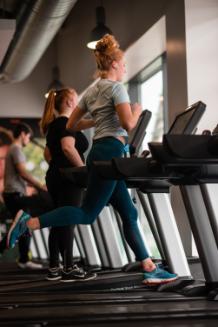
Photo Credit: Rob Coombe.
A healthy approach to life is like a well-baked cake. Well, maybe something a little healthier than a cake perhaps…! So, when the right combination of lifestyle ingredients is lovingly and intentionally put together, they add up to the healthiest possible body, mind and soul - the much-desired holy grail which we all refer to as ‘work-life balance’.
A healthy approach to life is like a well-baked cake. Well, maybe something a little healthier than a cake perhaps…! So, when the right combination of lifestyle ingredients is lovingly and intentionally put together, they add up to the healthiest possible body, mind and soul - the much-desired holy grail which we all refer to as ‘work-life balance’.
That’s easier said than done though. We know that. There are no ‘silver bullets’ which single-handedly solve the complex challenge of navigating a demanding modern lifestyle whilst remaining physically and mentally healthy.
In particular, juggling the pressures and demands of working life alongside everything else that life holds can be particularly challenging.
The 2021 ‘Move Your Mental Health Report’, published by the John W Brick Foundation in America found that,
“When considering solely randomised controlled trials, 87% [of subjects] found statistically significant positive associations between physical activity or exercise and mental health.”
In particular, the study found that regular exercise helped to improve the sleep and the mood of subjects as well as helping them to manage stress, anxiety and intrusive or racing thoughts.
Let’s face it, we’re certainly not the first people to highlight the undeniable and vital role which physical exercise plays in achieving the best possible overall health and work-life balance!
So, although getting out of bed an hour earlier or watching one hour less of Netflix a few nights per week might feel like an inconvenience, it could be easily argued that spending that time on intentionally getting regular exercise will benefit multiple areas of your life.
Whether improving your physical health, self-confidence, focus, energy levels or mental health, the benefits are numerous and compelling.
To find out about the range of physical health facilities and solutions which Exeter University Sport offers, click here to find out more.
Date: 17 February 2022
